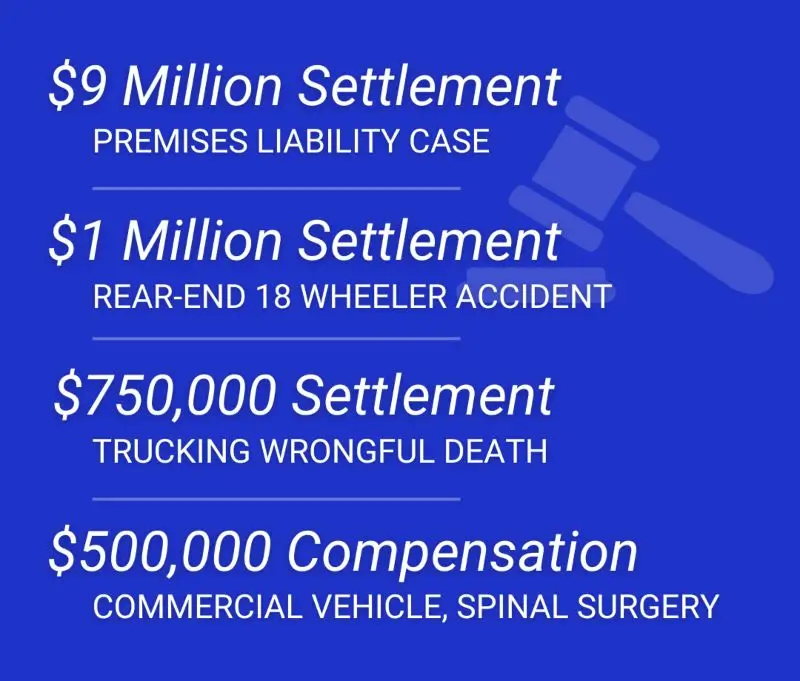Learn About Personal Injury Settlements in Houston
Understanding the tax implications of a personal injury settlement is crucial, especially if you live in Houston, Bellaire, McAllen, Edinburg, Austin, Corpus Christi, or San Antonio. Whether compensation covers medical expenses, lost wages, or emotional distress, taxation varies based on the nature of the settlement. At Nava Law Group, our team ensures you confidently handle the financial aspects of your case while staying informed about your obligations. Knowing how taxes may impact your settlement empowers you to make better decisions and secure the maximum benefit from your recovery. Reach out today to learn how we can assist you.

What’s the Rule About Paying Taxes on Settlements?
When it comes to lawsuit settlements, understanding tax rules is essential. Most settlements are taxable income; you must show if any portion qualifies for an exemption. Federal tax rules apply to all settlements, while state taxes vary by location. Thankfully, Texas does not impose state income tax, so recipients in Texas only need to focus on federal tax obligations. Ensuring accurate reports and proper allocation in your settlement agreement is key to staying compliant and minimizing unnecessary taxes. Below are essential rules to help you understand how taxes apply to settlements:
- General Rule for Taxes – Settlement money is typically taxable unless proven otherwise with evidence. Proper documentation and clear allocation in the settlement agreement can help reduce taxable amounts. Lacking these, the IRS assumes all funds must be reported as income.
- Exceptions for Physical Injuries or Sickness – Settlements for claims involving physical injury or sickness may not be taxed. To qualify, the injury must meet the tax code requirements, and emotional distress payouts are excluded only if they are directly linked to physical conditions.
- Attorney Fees – Even the portion of the settlement paid to your attorney is considered taxable income. This means you need to report the full amount before deducting legal fees on your tax return.
- State Taxes in Texas—Texas has no state income tax, so lawsuit settlements received in Texas won’t incur additional state income tax liability. However, federal taxes still apply, requiring careful planning.
What is the Federal “Actual Damages Rule?”
The federal “actual damages” rule forms the foundation for determining the taxability of settlements awarded for various damages. This rule focuses on the purpose of the compensation, which addresses medical costs, emotional distress, or other losses. With clear distinctions based on the type of damage, the rule ensures the taxable and non-taxable amounts are appropriately calculated. Below are key points to understand how this rule works in practice, offering clarity on different types of damages and their tax implications:
- Medical Expenses Related to Physical Injuries or Sickness – Medical settlement amounts are non-taxable if they reimburse expenses without prior deductions. However, if the expenses were previously deducted, the reimbursed portion becomes taxable up to the prior tax benefit received.
- Compensation for Pain and Suffering and Emotional Distress – Such settlements are non-taxable when directly tied to physical injuries or illness. If unrelated to physical harm, any qualifying non-deducted medical costs or disallowed deductions can reduce the taxable portion.
- Lost Wages and Business Income – Lost wages are taxed as regular income, like typical employment earnings. For self-employed individuals, lost income or profits are taxed at self-employment rates.
- Property Loss Settlements – Compensation for property loss isn’t taxed unless it exceeds the property’s adjusted basis. Any amount beyond the adjusted basis becomes taxable income to the recipient.
- Punitive Damages – These are taxable because they punish the defendant rather than provide direct compensation to the plaintiff.
- Interest on Delayed Payouts – Any interest accrued from delayed insurance payments is fully taxable, regardless of the settlement’s purpose or nature.

Discover the Origin of the Claim Rule
The “origin of the claim” rule determines how settlements and judgments are taxed based on why the lawsuit began. It focuses on the primary claim made at the start, regardless of how the case is resolved. For example, if a lawsuit is filed for lost business profits and the case results in a settlement, the proceeds are taxed as income from lost profits. The settlement’s wording or timing does not change this tax treatment. The initial reason for filing the claim drives the tax classification. This rule applies even if a case settles early or isn’t formally filed in court.
Is Every Settlement Type Taxable?
Not all settlements are treated equally when it comes to taxes. Depending on the type of settlement, the tax implications can vary significantly. Understanding which kinds of settlements are taxable and which are not is essential, as this can impact how much money you keep after taxes. Below is a breakdown of common settlement types and their taxability. Knowing these distinctions can help you plan and avoid any surprises come tax season. Here is a closer look at some of the more common settlement types:
- Personal Injury Settlements – Settlements for personal physical injuries and sickness are generally not taxable due to Section 104 of the tax code. This includes compensation for medical costs, lost wages, and pain and suffering. However, punitive damages and court-awarded interest from these cases are taxable.
- Employment Settlements – Employment-related settlements, such as those for discrimination, retaliation, or wrongful termination, are fully taxable. The origin of the claim stems from non-physical workplace disputes, making this money subject to regular income taxes. Only settlements tied exclusively to physical injuries at work might qualify for tax exclusion.
- Lost Wages Settlements for lost wages or income are fully taxable. In employment cases, compensation for back pay, front pay, or similar lost wages is treated as ordinary income. These amounts are also subject to payroll taxes like Social Security and Medicare contributions.
- Emotional Distress Settlements – Awards for emotional distress are usually taxable unless they result directly from a physical injury. Physical symptoms caused by emotional harm, such as headaches or ulcers, don’t qualify for exclusion under Section 104, so compensation for these damages is taxable.
- Punitive Damages and Interest – Punitive damages are taxable as they punish the defendant rather than compensate the plaintiff. Pre- or post-judgment interest awarded by the court is also taxable since it accounts for the lost value of money over time, not for compensating injuries.
Can I Deduct Attorney Fees If My Settlement is Taxable?
Determining whether you can deduct attorney fees depends on the type of lawsuit involved. If your settlement is taxable, plaintiffs in cases like employment discrimination, retaliation, or specific whistleblower claims may deduct legal fees “above the line,” resulting in a full deduction. This classification helps reduce the taxable income reported. However, most other taxable settlements are not eligible for this deduction due to the 2017 Tax Cuts and Jobs Act. For these cases, plaintiffs must pay taxes on the total settlement money, including attorney fees. This highlights the importance of understanding your case’s tax implications.
Reach Out to Learn More
Securing a favorable personal injury settlement in Houston, Bellaire, or any Texas city should never come with the stress of tax confusion. The personal injury lawyers at Nava Law Group bring precision, strategy, and clarity to every step of the settlement process. With over 40,000 cases handled and over $1 billion recovered for our clients, our team understands the complexities of injury claims and their tax implications. Schedule a free consultation today to discuss your case with an experienced personal injury lawyer committed to helping you keep more of what you’ve won.








